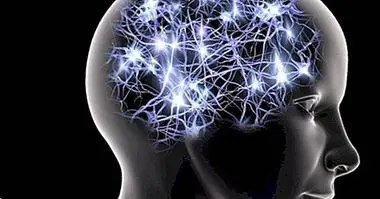The 35 psychological competencies that you should promote
Our current level of life and the demands placed on us by the environment day by day force us to develop different types of abilities in order to be able to adapt to the environment. Both in the workplace and in everyday life, there are a number of competencies that are very useful for this, both socially and culturally, psychophysiologically and psychologically.
With regard to the latter, which apply to almost all areas of life, we present a series of 35 psychological competencies that should be enhanced for its high utility in various vital areas.
- Maybe you're interested: "The 30 talents (or skills) that every psychologist should have"
What is a competition?
Being competent in something supposes to have the capacity to carry out in an efficient way the required action, we are talking about actions on a physical or mental level.
There are psychological competences of very different types that we develop to a greater or lesser extent throughout our personal growth . In this article we will see the main
35 psychological skills to be reinforced
Detecting personal weaknesses and improving them through the enhancement of psychological skills is a good way to improve both our quality of life and our work performance simply introducing some habits in our day to day . Choose the ones that you think are best suited to your case.
1. Empathy
Being competent to put yourself in the place of the other is fundamental when establishing an effective coexistence. This allows us keep in mind how they see the world others and be able to act with that perception in mind.
- Related article: "Are you empathic? 10 typical features of empathic people"
2. Analysis capacity
The understanding of the different events and phenomena is the first step to be able to establish different strategies and ways to respond to them. For this it is very useful to be able to decompose each problem into the different elements that make it up , especially when it comes to complex problems.
3. Ability to synthesize
Once each component of a problem is analyzed it is essential to be able to reintegrate all available information on a subject . It's about the ability to link related ideas together.
4. Self-motivation capacity
Human psychological functioning is influenced to a large extent by the ability of remain activated and interested in what we do . That is why it is very useful to enhance the ability to self-motivate and establish goals and objectives that excite us.
- Related article: "Types of motivation: the 8 motivational sources"
5. Emotional awareness
Emotions are an integral part of the human being that has great importance to explain their behavior and greatly influence their well-being. The ability to identify what we feel and what causes it It allows us to better understand ourselves and adjust our behavior and attitudes regarding reality.
6. Self-management or emotional regulation
Being able to manage them, put them in perspective or adapt them to the context in which we are is a great advantage.
7. Emotional autonomy
It is understood as such the ability to feel and take into account one's own emotions and those of others, without relying on external influences . The subject is responsible for their own emotions.
8. Team work
We live in society. Practically at any time we are in some way in contact with someone directly or indirectly, and may affect each of our actions to different people. Be able to join forces with others it can allow us to achieve different objectives more easily, by taking advantage of the resources and personal competences of each individual.
9. Stress management and psychological resistance
We are in an era characterized by a stressful lifestyle and full of commitments and competitiveness. Being able to manage situations in which we are under strong pressure it is something very required at the job level, at the same time that it helps us to be able to overcome the diverse circumstances that we live and to react in an adaptive way.
10. Mental flexibility
A psychological competence of great importance for our correct adaptation is the ability to have a certain level of mental flexibility. This means being able to capture other points of view, thoughts and ways of doing, and accept them as valid. It's about being able to assess other perspectives apart from our own and to be able to introduce changes in our way of seeing the world without locking ourselves in our original ideas.
11. Communicative capacity
We can know many things, but in a social entity like the human being it can be very important to be able to express oneself. In this way other people can be aware of what we try to convey and act accordingly to it . Training this type of skills supposes improving our social skills in turn.
- Maybe you're interested: "The 10 basic communication skills"
12. Creativity and lateral thinking
Establishing new ways of acting in response to specific problems, without depending on pre-established options, implies the possibility of obtaining new results while allowing us to develop as individuals and even as a species. Develop creativity and be competent to create innovative strategies It is therefore very useful.
13. Decision-making capacity
In life we must make decisions and prevent doubt from blocking us . While we must try to take into account the different perspectives and options, in the end we must act. The ability to make decisions is an essential element in our daily life, although for some people it can be complex. But like all previous and following competitions, you can train and optimize with practice.
- Related article: "The 'analysis paralysis', when thinking too much becomes a problem"
14. Capacity for planning and vision of the future
Every act has its consequences, and being able to visualize the effects of both our behaviors and environmental phenomena will allow us to start to develop preventive action strategies .
15. Improvisation ability
Although in the previous competition mentioned we talked about the importance of being able to prevent different aspects of reality, we can not always be prepared for what will happen to us. For this reason it is necessary to be able to quickly develop some course of action in the face of unexpected events, improvising in order to get out well of surprising or novel phenomena.
16. Ability to select information
At present we have virtually any type of information available to a single click. We can access numerous sources of knowledge, some of which are not entirely reliable or even if they offer information that may be contradictory. It is because of that Being able to select the information is very useful .
17. Assertiveness
When certain things happen to us or conflicts erupt between people, it is possible to react in different ways. A conformist passivity or an imposition of one's will can not only not solve the current problem but exacerbate it or even generate others in the future. One of the attitudes that will most help us in most cases is Assertiveness, which allows us to defend our rights and opinions in a clear and efficient manner without thereby violating the rights or integrity of others.
18. Reflection capacity
Our impulses are part of us and it is advisable to avoid a total repression of them. However, this does not imply being dragged by them continuously. We must be able to put a medium term and act in a way that allows coexistence with other human beings while looking for the best possible alternative behavior to achieve adaptation. Training this quality does not imply the repression of instinct, but rather that we are capable of acting rationally.
19. Discipline
It is understood as a discipline to establish a code of behavior and behavior that allows us to maintain order and act in an organized and systematic manner. Being able to maintain discipline will make us reliable people and that we can achieve more complex objectives .
20. Critical thinking
Each one of us has his own agenda, intentions and wishes. What we are told by others or the things we see may be biased by different aspects. Being able to analyze the reasoning that leads to a certain statement allows us to doubt the information we receive and to forge our own idea about reality in a more objective way.
21. Willpower and persistence
While it is necessary to be flexible and take into account different perspectives on the same issue, it is important that if we are clear about our objectives we can be able to achieve them. Discipline and self-motivation are aspects that derive from willpower. Be competent in fixing and Persistently pursue our goals It will help us meet our goals and feel more satisfied with ourselves and our lives.
22. Sense of self-efficacy
Believing in one's own possibilities is necessary in such a competitive world. Expectations about one's performance should motivate us to continue forward. Perceiving us as ineffective can cause us frustration and suffering , in addition to diminishing our motivation and performance. In fact, it can generate a Pygmalion effect that causes us to end up having the performance we expected to have.
23. Spontaneity
Although being reflexive is very useful in many aspects, it can sometimes lead us to be excessively rigid and to leave aside our authentic naturalization. It is necessary to be competent to be ourselves, doing things that we want despite the fear of possible consequences.
24. Mental agility
Having an agile thinking is fundamental today. Think and observe the different parts of a problem with a certain speed facilitates our immediate reactions to environmental stimuli in an adaptive way.
25. Inference capacity
The data we obtain from the environment can be analyzed and synthesized with great efficiency, but there is a very important aspect linked to the observation that involves a certain level of subjectivity and that allows us to make predictions based on the data . It is the ability to infer, to link the data and information obtained and synthesized with other aspects of reality with which they are related.
26. Responsibility
Being able to take responsibility for one's actions is a basic competence for proper functioning. Take into account the effects of our actions and take care of the damages they can cause, repair them and solve them. And the responsibility does not refer only to this aspect, but also to know what is expected of us based on our role and act accordingly. It also means being able to recognize one's merits.
27. Persuasive and influential capacity
Convincing others of their own vision and causing changes in their habitual behavior is a type of key competence in certain aspects of life. Very sought after in different market niches Being competent to persuade others also serves to defend our rights and positions against any type of external abuse.
28. Leadership
Linked to persuasion, leadership competencies assume the ability to put yourself in front and direct your own and others' behavior in the direction of a common goal. It is not only about influencing but also about being able to organize, establish objectives and methods to achieve them, motivate others and help resolve any doubts that may arise.
29. Setting realistic goals
People need to be motivated in order to give meaning to the emission of behaviors. For this we propose goals or objectives. However, many people have problems when establishing what goals to put, demanding too much or too little, so that either they can not get to meet them or do not put too much effort and lose their motivational capacity. It is because of that we must train ourselves to establish goals adjusted to our possibilities , that they represent an attainable challenge and that they can be structured and subdivided in small steps that allow their attainment.
30. Context assessment
Regardless of the handling of the various information that surrounds us, we must bear in mind that these are located in a specific context. What happens has a different significance depending on the place, time and the people who live it. That is why we must train in contextualize any information and situation .
31. Application of knowledge
Although theoretical knowledge is important, it is just as important to be able to put this information into practice or apply it in real life. Train this competition supposed to put the theory into practice , discovering or analyzing concrete ways in which the same or other knowledge is transformed into different behaviors and actions.
32. Resource management
When solving problems, we need to take into account what we have for it. We must be able to recognize and take advantage of all the elements that are available, improving the chances of success of our company or project .
33. Delegate
We have to be responsible for our own acts, but also we must be aware of our limitations . In many cases we will have to trust and delegate to other people. Knowing in whom and from what specific aspects it may be beneficial for another person to be in charge so that the task is carried out successfully can also be trained with practice.
34. Capacity for attention and targeting
Another key competence is the one that has to do with the capacity of Focus on a specific aspect . This allows us to be able to clearly recognize our objective and the means at our disposal to achieve it, ignoring other elements that have no effect on it.
35. Proactivity
Have initiative and build new goals and ways to improve It's very important. Linked to creativity and innovation, it helps to stay motivated and enjoy new experiences, always starting from the basis of the responsibility of the own behavior and having supplied the basics.



















